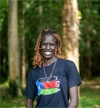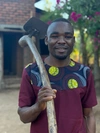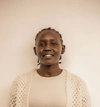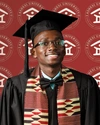John Bok Chol
Motivated By Contributing to Health Equity and Systems Strengthening
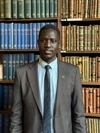
I am a healthcare professional shaped by a deep commitment to resilience, service, and transformative impact. Growing up in a context of fragility and limited access to formal education, I quickly understood the power of education as a tool for personal and community transformation. From an early age, displaced to Kenya as a refugee, I demonstrated a focused drive to overcome systemic barriers, pursuing my foundational education across fragile borders and rebuilding academic momentum where opportunities emerged.
Motivated by a vision to contribute meaningfully to health equity and systems strengthening, I pursued medical training at Moi University in Kenya—an experience that sharpened my clinical skills and deepened my resolve to lead in challenging contexts. During my studies, I held multiple leadership roles, including serving as Chairperson of South Sudanese students in North-Rift and Western Kenya. In this role, I advocated for student welfare, engaged with the South Sudanese ambassador to Kenya, and helped open communication channels between students and national stakeholders. I was also nominated by the Dean of Students to chair two high-level university election committees, both of which I conducted successfully. Despite facing regional instability and financial barriers, I completed my medical degree with support from Windle Trust International and my family.
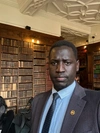
This journey has been more than a personal pursuit—it reflects a broader dedication to shaping resilient health systems, investing in local capacity, and building pathways for sustainable development. I now carry forward this mission through global health initiatives, research, and partnerships that elevate underserved communities and catalyse lasting change. With a vision to improve health indicators across South Sudan and Africa at large.
After earning my medical degree at Moi University, I completed my internship at a hospital in Kenya, where hands-on clinical experience exposed me to the broader systemic challenges affecting healthcare delivery. I began to see that while treating individual patients is vital, there was an even greater need to address structural issues within the health system. This realisation motivated me to pursue advanced training in public and global health, with a focus on shaping policy and designing sustainable interventions. I first learned about the Master’s in International Health and Tropical Medicine at the University of Oxford through a peer. I was drawn to its focus on health system resilience and interdisciplinary approaches. While working part-time at a hospital in Meru, I dedicated myself to preparing scholarship applications. I was later awarded a place in the Mastercard Foundation Scholars Program at Oxford—an opportunity that significantly shaped my academic and professional journey.
At Oxford, I gained not only academic training but also the critical thinking skills and global perspectives essential for health leadership in complex settings. Immersed in a diverse, high-intensity environment, I explored the structural and policy dimensions of global health challenges, especially those affecting Africa. My experience as part of the Africa Oxford Initiative (AfOx) community deepened my resolve to return to the continent and contribute meaningfully to transformative health solutions.
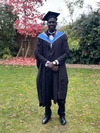
Following Oxford, I joined The Global Health Network and AMREF International University as a fellow. Working under the leadership of Prof. Trudie Lang, I became part of a dynamic international team focused on connecting researchers, institutions, and health systems through knowledge sharing and capacity building.
I contributed to two key projects: MESH, an open-access platform supporting community engagement in global health research, where I worked on WHO Mpox social behavioural research with Dr. Alun Davies. Our findings informed WHO interim guidance on outbreak response. In ODIN, a project enhancing wastewater-based surveillance in Africa, under Dr. Paul Kingpriest’s mentorship, I coordinated activities with teams in Burkina Faso, DRC, and Tanzania and co-led a scoping review titled “Harnessing Genomics and Bioinformatics for Pathogen Surveillance in Africa,” identifying critical gaps and opportunities in training and workforce development across the continent.
I am currently collaborating with AMREF International University and Western University (Canada) on a scoping review examining leadership competencies and best practices for scaling health innovations in low- and middle-income countries. This reflects my commitment to evidence-informed global health leadership. Additionally, I serve as a peer reviewer for an academic journal, having reviewed three manuscripts to date—an opportunity that has deepened my engagement with emerging research and supported the dissemination of high-quality scientific work.
Each of these experiences has expanded my understanding of collaborative global health work and affirmed my commitment to evidence-driven, community-anchored public health leadership. I am now focused on leveraging this experience to contribute to broader health systems strengthening, research equity, and cross-border collaboration in Africa and beyond.
The barriers I faced in accessing education are representative of a broader systemic challenge that many young people across Africa confront. Limited infrastructure, socio-economic constraints, and displacement due to conflict or crisis continue to restrict the potential of countless talented individuals. Yet, I have always regarded education as more than a personal aspiration—it is a transformative tool for unlocking not only individual potential but also for building bridges of shared understanding and collective progress.
For me, education has been a pathway to critically examine the challenges faced by my community and to develop sustainable, context-relevant solutions. Every obstacle along my journey served as a reminder that my efforts extend beyond personal ambition—I carry the hopes and expectations of a community that continues to believe in the power of knowledge.
The Mastercard Foundation Scholars Program that enabled me to study at Oxford has been truly life changing. It afforded me access to world-class education, and more importantly, equipped me with the tools to contribute meaningfully to societal change. I have come to deeply appreciate that knowledge gains its true value when used in service of others.

